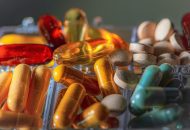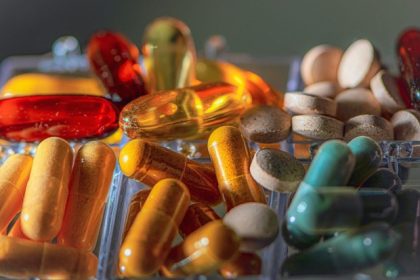Craving Caffeine? Here Are Some of the Reasons Why

WASHINGTON — When you wake up in the morning, do you crave the smell of freshly brewed coffee? A daily cup of coffee or caffeinated tea can boost your mood, enhance focus, reduce fatigue and even improve exercise performance. But, too much of anything can be harmful, so finding the balance is important.
Here, we’ll explain the science behind your daily cup of tea or coffee, what caffeine does in your body and how it helps you get through the day. We’ll also let you know the recommended limits and side effects to look out for.
What is Caffeine?
Caffeine is a plant alkaloid containing methylxanthines, which stimulate your central nervous system. Caffeine occurs naturally in coffee beans, cacao beans, tea leaves, yerba maté leaves and guarana berries. Caffeine can also be created and added to supplements, sodas, energy drinks and some foods.
Caffeine consumption is very common — about 85% of adults in the United States consume an average of 135 milligrams of caffeine daily, about a 12-ounce cup of coffee.
How Caffeine Works in Your Body
After you consume caffeine, it enters your bloodstream and may take up to 45 minutes to get absorbed. Its peak effects occur between 15 and 120 minutes after ingestion and last an average of five hours. Everyone metabolizes caffeine differently, so these numbers may vary.
Caffeine blocks adenosine receptors, neurotransmitters that can make you feel tired, from binding. Then, it stimulates the release of other neurotransmitters, including dopamine, norepinephrine, serotonin, gamma-aminobutyric acid and glutamate, which can boost your mood.
Some sources of caffeine, like coffee and tea, contain polyphenols, natural chemicals that contain antioxidant and anti-inflammatory properties. For this reason, some studies link coffee and tea consumption with potential health benefits, including a lower risk of cardiovascular diseases, type 2 diabetes and a longer life.
Though caffeine can be obtained from other sources, potential health benefits come from natural sources like coffee and different types of tea.
Caffeine and Efficiency
A moderate amount of caffeine, around 40 to 200 mg, makes you feel more awake, alert and energized. Here are a few areas where caffeine can help you during your daily routine.
- Focusing at Work: Caffeine can improve cognitive performance, mental focus, attention and reaction time. It can also help with short-term memory and decision-making. Research shows it also helps improve cognition when you are sleep-deprived, which you may already know from experience.
- Mood Booster: Since caffeine increases dopamine production, you often get a mood boost from your cup of coffee or tea. Dopamine also increases feelings of motivation, which can help you complete tasks. Some research shows caffeine may help treat depression.
- Exercise Performance: Over 100 years of research have shown how caffeine helps improve exercise performance. It reduces fatigue and helps you feel more alert during endurance exercise, sports training and strength training.
- Caffeine increases endurance in long exercise sessions by extending the time you can exercise before fatiguing.
- Caffeine can also improve performance in short-term, high-intensity workouts by sharpening your focus and attention.
- During resistance training, some research shows caffeine can lower your rate of perceived exertion. RPE is a way of measuring how difficult or heavy an exercise feels. By perceiving that it’s easier, you can work a little harder.
Daily Limits and Side Effects of Caffeine
While drinking a cup of coffee can help you feel more alert at work and at the gym, there can be too much of a good thing.
The U.S. Food and Drug Administration lists 400 mg of caffeine as the daily limit.
- An eight-ounce cup of coffee contains about 95 mg of caffeine, so about four or five cups can reach 400 mg.
- An eight-ounce cup of black or green tea contains 30 to 50 mg of caffeine.
- An eight-ounce serving of an energy drink can contain 40 to 250 mg of caffeine.
- A 12-ounce serving of caffeinated soda contains 30 to 40 mg of caffeine.
Research shows the ideal amount of caffeine is up to two eight-ounce cups of coffee, around 190 mg of caffeine. Higher doses that go above the limit can trigger several side effects.
Common Caffeine Side Effects
Since everyone metabolizes caffeine differently, you may experience side effects after any amount. Always see your doctor if you are concerned. Here are some to look out for.
- “Jittery” feeling.
- Anxiety.
- Agitation.
- Facial flushing.
- High heart rate and heart palpitations.
- High blood pressure.
- Insomnia or trouble sleeping.
Regularly consuming caffeine can also cause a dependency on caffeine. You may increase your tolerance and need more to feel the effects. Stopping caffeine usage may then trigger headaches, fatigue, low mood and insomnia.
A Cup of Coffee
Having a cup of coffee in the morning is more than an enjoyable way to start the day. Science shows that it tells your brain to help you feel awake and alert while improving your mood, workday and exercise performance. Just be careful not to go past the 400-milligram limit set by the FDA to avoid side effects.
Although research shows caffeine can improve energy when you are sleep-deprived, it doesn’t replace the value of getting quality sleep — but it may work in a pinch.
Our website content, services and products are for informational purposes only. The Well News does not provide medical advice, diagnosis or treatment. If you have medical concerns or questions, discuss with your health care professional.
You can reach us at [email protected] and follow us on Facebook and X (formerly known as Twitter)

























